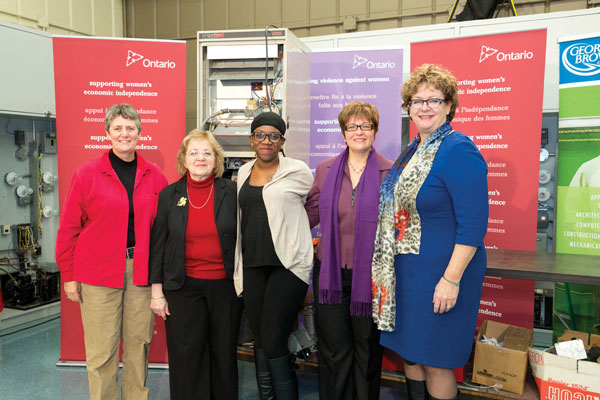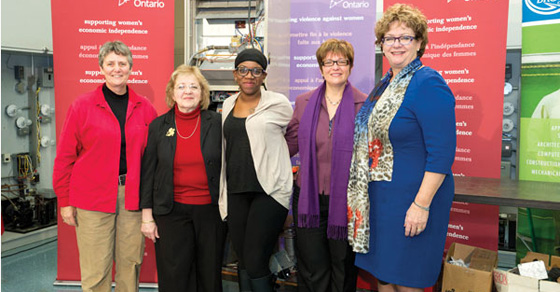
GBC administrators show their support for training programs for abused and at-risk women. From left to right: Peg Everall, Georgia Quartaro, Chamaikha Johnson, Minister Theresa Piruzza, and Anne Sado.
Photo courtesy of the Ontario Women’s Directorate.
One of the major concerns of women who are thinking of leaving a violent relationship or who have left one is how she will be able to take care of her children and have economic security while living on her own.
On Nov. 27, Theresa Piruzza, Minister Responsible for Women’s Issues, announced renewed ministry funding for a variety of province-wide programs to help women achieve economic independence through academic and employable skills training.
Piruzza stated, “Leaving an abusive relationship takes courage and resources. The employment training for abused and at-risk women program helps women discover their own potential and build a more secure and meaningful future for themselves and their children.”
The announcement took place at George Brown College (GBC) with Anne Sado, president of GBC; Georgia Quartaro, dean of the Centre for Prepatory and Liberal Studies; Peg Everall, program mentor; and Chamaika Johnson, a recent graduate of the architectural technician program in attendance.
Quartaro said, “The training received in this program makes a dramatic difference in the lives of vulnerable women. We see it everyday. This program trains these women for meaningful careers and it enables them to create a brighter future for themselves and their children.”
GBC‘s assaulted women and children’s counsellor/advocate program (AWCCA), in collaboration with other programs and community partners, has provided assaulted women and women at-risk, with academic upgrading and hands-on skills training in different non-traditional trades since 2007.
According to Anna Willats a professor in the AWCCA program and the co-ordinator for GBC’s women transitioning to trades and employment program, the first funded project was from 2007-2009 as part of the implementation of Ontario’s 2004 Domestic Violence Action Plan, with 22 women graduating from basic refrigeration and Gas Technician 3 training.
The next project was from 2010-2012 and saw 25 women graduate in different fields, such as building maintenance and supervision, nursing, baking /cooking and child and youth work..
This funding period of 2013-2014 will see 50 women in total attending 14 week training sessions in academic upgrading, interview techniques, hands on skills training, work placements and includes tuition support.
Willats noted that, “Women have told us how their lives have been turned around by these programs, and they have made friendships that have lasted long after their training has ended. We look forward to working once again with our partners to help women to identify and reach their goals.”


